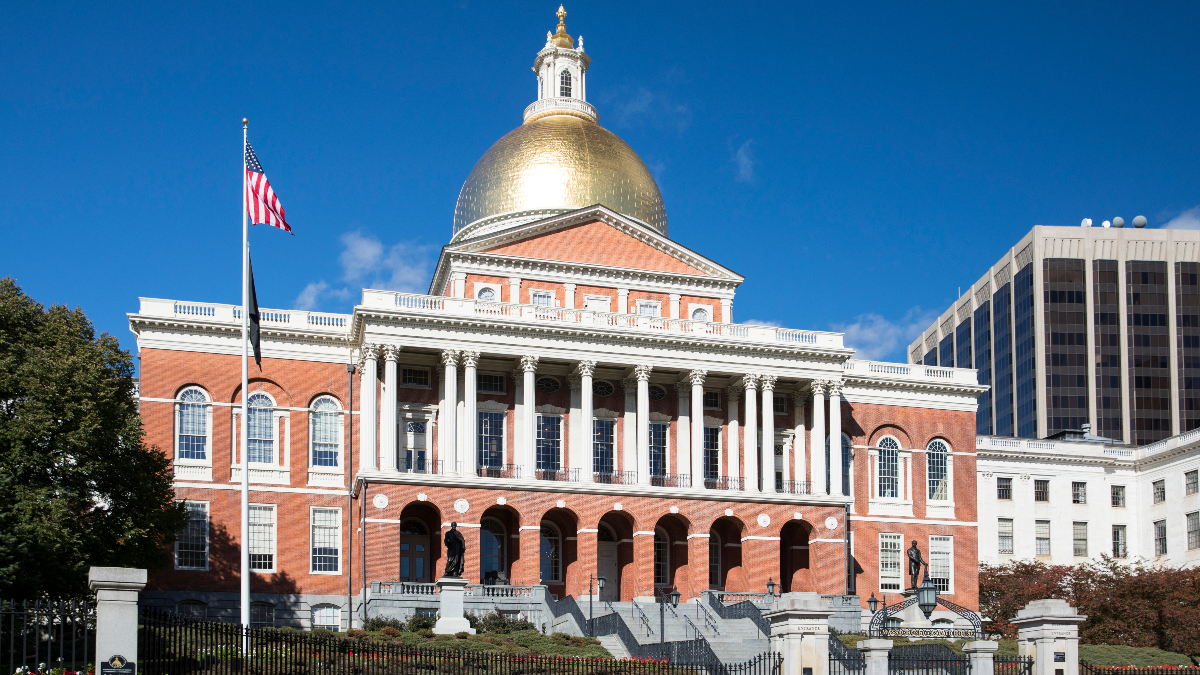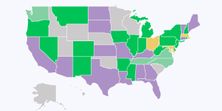Once Promising Massachusetts Sports Betting Bill Now Aims for 2021
Tim Graham/Getty Images. Pictured: Massachusetts State House.
New casinos, bipartisan legislative support and a rabid sports fanbase seemingly made Massachusetts the perfect legal sports betting candidate. Instead, the 2020 football season will come and go without a chance to place a legal sports bet in the state.
The Massachusetts state Senate removed sports betting from a sweeping economic development bill earlier this year despite overwhelming support in the House, effectively ending what had been a promising path toward legalization. With major budget work completed and an election looming, there’s little chance lawmakers make serious progress on a bill that has already faltered for the better part of a year.
Prospects grew dimmer after the state’s leading college athletic representatives publicly opposed college sports betting last month, complicating what is already one of the crucial sticking points holding up the bill. Lawmakers don’t begin their next session in January 2021, meaning Massachusetts sports betting is stalled until next year and possibly longer.
Background for Massachusetts Sports Betting
After centuries of opposition, Massachusetts welcomed brick-and-mortar gaming with a groundbreaking 2011 bill that permitted up to three full-scale commercial casinos. MGM Springfield opened in 2018, Encore Boston Harbor in 2019 and a third commercial gaming facility, as well as two Native American casinos, are set to open in the coming years.
All these facilities would be likely candidates to host retail and possibly online sportsbooks. Since the Supreme Court struck down the federal sports gambling ban in May 2018, Massachusetts lawmakers have floated the idea for legal sports betting at these facilities and possibly statewide.
After floundering in 2018 and 2019, it seemed elected officials had a ready-made legalization path in 2020. Lawmakers in the Democratic-controlled General Court, as well as Republican Gov. Charlie Baker both, supported legal sports betting, with Baker even co-sponsoring a bill introduced early in 2020.
Despite the bipartisan support, the bill never received a full vote in the General Court.
Massachusetts officials, as with most other states, squabbled over purveyor access, tax rates and a host of other legislative sticking points that delayed the bill. The question over legal college sports betting also halted progress in a state that still stings from the Boston College men’s basketball team point-shaving scandal of the late 1970’s.
After months of negotiations, the bill was still stuck as of March 2020 and then pushed to the backburner by the COVID-19 pandemic. A last-ditch effort to include sports betting into a much larger economic development bill was overwhelmingly supported by the House, but it was removed by the Senate, which wanted a stand-alone bill.
Massachusetts is one of a handful of states with a year-round legislature, but most major decisions are completed by July 31 of the second year in the General Court’s two-year legislative term. The second annual session of 2019-2020 term ended July 31 without a sports betting bill, effectively ending its hopes for the 2020 calendar year.
Lawmakers remain in Boston for sporadic meetings, but the political realities of next month’s election all but eliminates any chance of significant legislation before the new term starts next January.
A letter dated last month from Boston College, Boston University and Harvard University officials opposing legal college sports betting further hinders the prospect of collegiate betting in a possible bill, which could then jeopardize the entire legislation.
New England’s Other Sports Betting Options
Massachusetts’ struggles have been the rest of New England’s gain.
Rhode Island and New Hampshire both allow statewide mobile sports betting. Connecticut and Maine have both struggled with their sports betting bills, but Massachusetts’s delays still give them a potential head start. Even Vermont, one of the few remaining states without any land-based gaming facilities, is slowly advancing a sports betting study bill.
Still, Massachusetts remains the area’s key piece. It has the region’s largest metropolitan area in Boston and a larger population than nearly all other New England states combined. It’s also home to the region's beloved Boston Red Sox, Boston Bruins, Boston Celtics and New England Patriots.
With Connecticut’s lawmakers and Native American casinos still locked in a sports betting quagmire, Massachusetts’s two commercial casinos could easily house the region's highest-grossing sportsbooks. And since New England (DraftKings) and Rhode Island (William Hill – Caesars) only allow one sports betting operator apiece, Massachusetts could have the first competitive mobile and retail marketplace in New England.
All this will weigh on sports betting backers’ minds when they return to Boston for the 2021 session in January. The political obstacles will remain, but so too will the market’s potential.
How would you rate this article?


